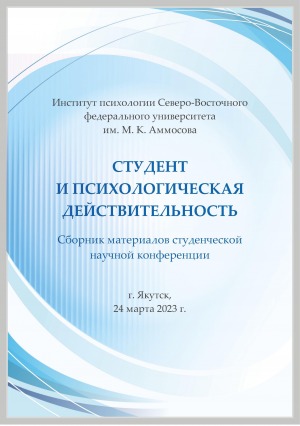Место работы автора, адрес/электронная почта: Северо-Восточный федеральный университет им. М. К. Аммосова, Институт психологии ; 677013, г. Якутск, ул. Кулаковского, 42 ; e-mail: tn.sidorova@s-vfu.ru ; https://www.s-vfu.ru
Область научных интересов: Социальная психология инноваций, организационная социальная психология, социальная психология отклоняющегося поведения, психология семьи
ID Автора: SPIN-код: 9136-4036, РИНЦ AuthorID: 689083
Источник: Мир науки. Педагогика и психология.- 2023. - Т. 11, N 6
Количество страниц: 10 с.
The article examines the results of a study on the stereotyped image of the Yakut ethnic group in the virtual space. The study was based on content analysis of comments on popular videos reflecting stereotypes about Yakut people. In the first stage of the research, sources of stereotypes were identified, including media, social networks, and other platforms. Three popular videos with the highest number of views, which reflected stereotypes about Yakuts, were selected. In the second stage, 57,500 comments were analyzed, out of which 10,700 comments related to the stereotyped image of Yakuts were selected. Text semantic analysis methods and categorization of semantic units were used for data analysis. As a result of the study, it was revealed that the image of Yakuts in the virtual space is generally positive. Most comments contained positive emotional evaluations and reviews about Yakuts. Neutral comments confirmed or refuted facts, and negative comments were contradictory and covered various aspects of reality. The analysis of the content of the Yakut image by structural components showed that in the virtual space, Yakuts are attributed with positive personal qualities such as generosity, bravery, and kindness. Their cohesion, adherence to traditions, and success in various fields of activity are also noted. The study confirms that the internet space plays a significant role in shaping the image of ethnic groups. The heterogeneity of the ethnic group's image may indicate diverse experiences of interacting with representatives of the ethnic group and/or the availability of information about the ethnic group online. The formed image of the ethnic group on the internet can influence the way and character of interpreting the behavior of ethnic group members in real life. The study was conducted within the framework of a research project and is an important contribution to the study of the internet's influence on the formation of an ethnic group's image.
Егорова, А. И. Образ этноса в виртуальном пространстве / А. И. Егорова, Т. Н. Сидорова ; ФГАОУ ВО "Северо-Восточный федеральный университет им. М. К. Аммосова" // Мир науки. Педагогика и психология.- 2023. - Т. 11, N 6. - C. 73.
Издательство: ИЦ НБ РС (Я)
Год выпуска: 2023
Количество страниц: 175 с.
Количество страниц: 10 с.
- Когнитивный двойник: развитие креативного мышления у детей > Развитие креативного мышления у детей,
- Общественные науки. Образование > Народное образование. Воспитание. Обучение. Организация досуга > Общеобразовательная школа. Дошкольные учреждения,
- НАУКА ЯКУТИИ > ОБЩЕСТВЕННЫЕ НАУКИ > Народное образование. Воспитание. Обучение. Организация досуга > Общеобразовательная школа. Дошкольные учреждения.
Сидорова, Т. Н. Особенности развития креативности у учащихся сельских и городских школ / Т. Н. Сидорова ; ФГАОУВО "Северо-Восточный федеральный университет им. М. К. Аммосова" // Мир науки. Педагогика и психология. - 2022. - Т. 10, N 4. - C. 46.
Количество страниц: 5 с.
Острохонская, К. В. Особенности эмоционального интеллекта у подростков, занимающихся кибер-спортом / К. В. Острохонская ; научный руководитель Т. Н. Сидорова ; Северо-Восточный федеральный университет им. М. К. Аммосова // Научный электронный журнал Меридиан. - 2019. - N 15 (33). - C. 498-500.



